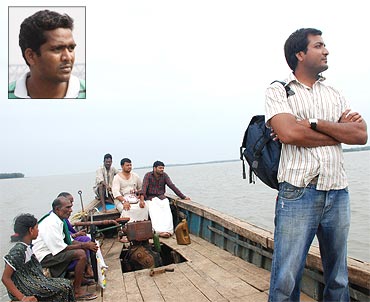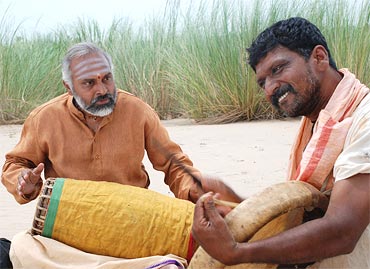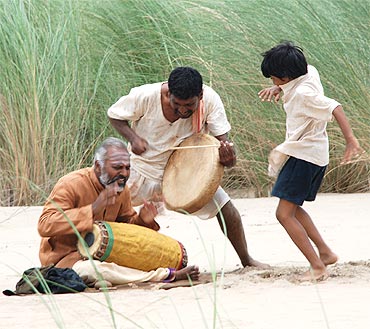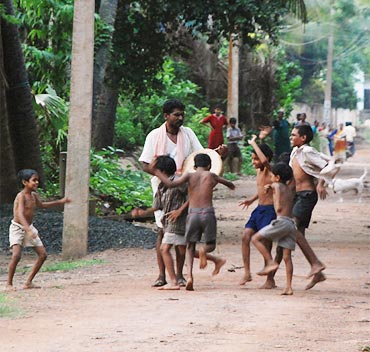 | « Back to article | Print this article |
Pradeep Maadugala: People will now believe in me
Tamil and Malyalam movies may have completely ruled the 58 National Film Awards but Advaitam is the only Telugu film to have won the prestigious award this year.
This short film, in the non-feature film category directed by Pradeep Maadugala and produced by Vijayapal Reddy, won the Best Educational Film Award ( Rajat Kamal and Rs 50,000 each).
The citation reads: The documentary exposes the human apathy of class difference through casteism in a very evoking and natural style. Through fun-filled situations and distressing moments, the director portrays the anguished and tragic aspects of casteism effecting human value and relationships.
Director, Pradeep Maadugala, an LLB graduate from Warangal (Andhra Pradesh), has been in the film industry for some time. He was been associated with Chandrasekhar Yeleti in his films Okkadunnadu and Prayanam. He has been an animator who has worked with Data Quest.
Pradeep made this short film Advaitam to enhance his resume as a filmmaker though his main target is to make a feature film. Radhika Rajmani talks to Pradeep about his film and the National award:
How do you feel after winning the National Award?
At first there was confusion as the award was announced in the feature film category and we had sent it in the non-feature film category. Then we checked on the website and confirmed it. It was exciting to win the award.
The film had won the Best Film in the Short and Documentary Film Festival of Hyderabad last year. It was also screened at a festival organised by the Kerala State Government. Then I sent it for the National Awards.
'I feel I should make more of such films'
Do you feel a sense of responsibility after having won the coveted Award?
Yes, I feel I should make more of such films.
Why did you choose to make this film?
I have been working in the film industry (direction) since the last seven years. I thought I should make a short film for my portfolio. My father, who was an advocate, had written the short story.
Was your father's story inspired by real life?
He took some instances and people from real life and wrote the story. This film seems to be based on the caste system- a story of two friends from the higher and lower castes.
The two main characters represent two social communities. However, the central theme is art rather than caste.
'It's a story about two friends'
What's the story about?
It is about two friends - one from the upper caste, who is into classical music (mridangam) and the other from the lower caste who is an exponent of folk music as he plays the dappu.
The film is about how their friendship develops, their problems, and how they overcome them. It also highlights how the two musicians compete to show off their skills.
Did you adopt a docu-drama format with actors? If so, how did you choose them?
My lead actors were from theatre, namely Deekshitalu and Jaya Rao (who is settled in Chennai). The role of the Brahmin's wife was played by Rakhi (who essayed the role of the heroine's mother in the film Avakkai Biryani) and there was another child artist.
Where did you shoot the film?
It was shot in East and West Godavari districts.
Music, you said, is the central theme of this film. How did you choose your music director?
Santosh Narayanan, the Chennai-based composer, scored the music for this film. He was an associate of Rahman and is now working on his own World Peace Album. I was introduced to him by Shamdat (Director of Photography).
'I am now working as an associate to director Devakatta'
How long did it take for you to shoot the film?
The pre-production work took five months and the actual shoot took just 5 days but the post-production took time.
How did you get actor Kamal Kamaraju to do a voice over for this film?
Kamal had done the voice over for another film ''I am Famous." I have known him for the past five-six years. He is a good artist. So I roped him in.
How do you think this award will help you?
It will bring about credibility. It will help me get funding. People will believe in me.
What are your plans for the future?
I am now working as an associate to director Devakatta who is busy with the pre-production of his film Autonagar Surya.



